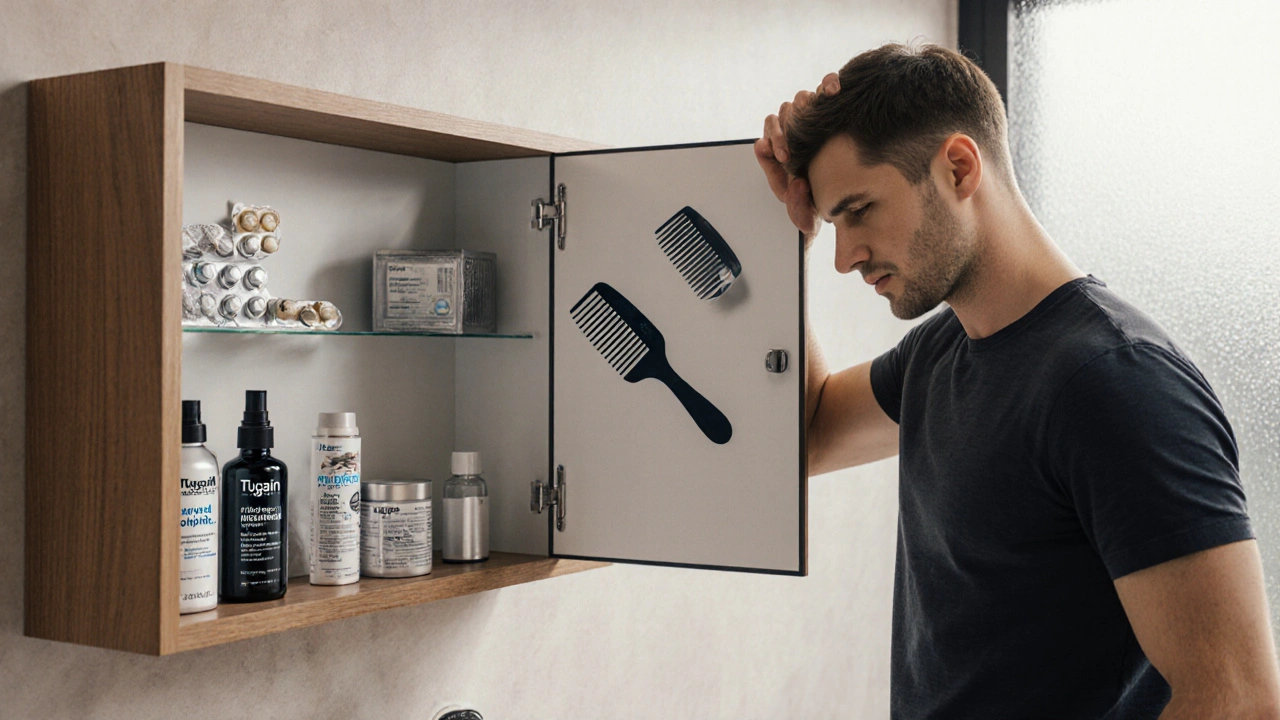Minoxidil: Everything You Need to Know
When talking about Minoxidil, a vasodilator that doubles as a popular hair‑growth treatment. Also known as Rogaine, it started in blood‑pressure clinics before researchers found it could revive dormant hair follicles.
In the world of hair loss, the most common type is androgenetic alopecia, often called male or female pattern baldness. This condition triggers miniaturization of follicles, leading to thinner strands and eventual shedding. Understanding that link helps you see why Minoxidil is marketed as a first‑line solution for early‑stage thinning.
Key Topics Covered
Many users pair Finasteride, an oral 5‑alpha‑reductase inhibitor that blocks the hormone DHT with Minoxidil. The combination tackles hair loss from both angles: Finasteride reduces the hormonal trigger, while Minoxidil boosts blood flow to the scalp and encourages follicle activity. This duo often yields faster, denser regrowth than either product alone.
Beyond prescription pills, topical treatments, including foams, solutions, and even custom‑mixed shampoos, serve as the delivery method for Minoxidil. The drug’s efficacy hinges on consistent application—usually twice a day—for at least four months before you notice any change. Skipping doses or using the wrong concentration (2% vs. 5%) can stall progress.
Safety matters, too. The typical dosage for an adult is 1 ml of the 5% solution per scalp area, applied with a dropper or pump. Common side effects include mild scalp irritation, itching, or a temporary increase in shedding during the first weeks. Rarely, systemic absorption can cause low blood pressure or unwanted facial hair growth, especially with oral minoxidil. Knowing these risks lets you weigh benefits against potential drawbacks.
Online pharmacies often tout cheap Minoxidil alternatives, but quality varies. Look for licensed UK sellers, verify that the product contains the stated concentration, and read user reviews for consistency. Buying from reputable sources reduces the chance of counterfeit pills that might contain harmful fillers.
Below you’ll find a curated collection of articles that dive deeper into each of these points—how Minoxidil works, real‑world dosing strategies, side‑effect management, and how it stacks up against other hair‑loss options. Whether you’re just starting to notice thinning or you’ve tried several remedies already, these pieces will give you the practical insight you need to decide your next step.

Tugain Solution (Minoxidil) vs Top Hair‑Loss Alternatives: Detailed Comparison
- Sep, 28 2025
- 20
A comprehensive guide compares Tugain Solution minoxidil with finasteride, Rogaine, PRP, laser therapy, and hair transplants, detailing costs, effectiveness, side effects, and how to choose the right option.
Categories
- Medication Information (113)
- Health and Wellness (52)
- Women's Health (6)
- Support Resources (5)
- Supplements (5)
- Pharmacy Reviews (5)
- Dermatology (4)
- Mental Health (4)
- Nutrition (3)
- Fitness and Wellness (3)
Archives
- February 2026 (12)
- January 2026 (27)
- December 2025 (30)
- November 2025 (24)
- October 2025 (29)
- September 2025 (14)
- August 2025 (2)
- July 2025 (7)
- June 2025 (2)
- May 2025 (3)
- April 2025 (4)
- March 2025 (3)
- online pharmacy
- dietary supplement
- medication safety
- health benefits
- side effects
- generic drugs
- drug interactions
- treatment
- wellness
- optimal health
- diabetes management
- safe medication purchase
- online pharmacy Australia
- brand name drugs
- authorized generics
- generic medications
- link
- women's health
- dietary supplements
- sleep
